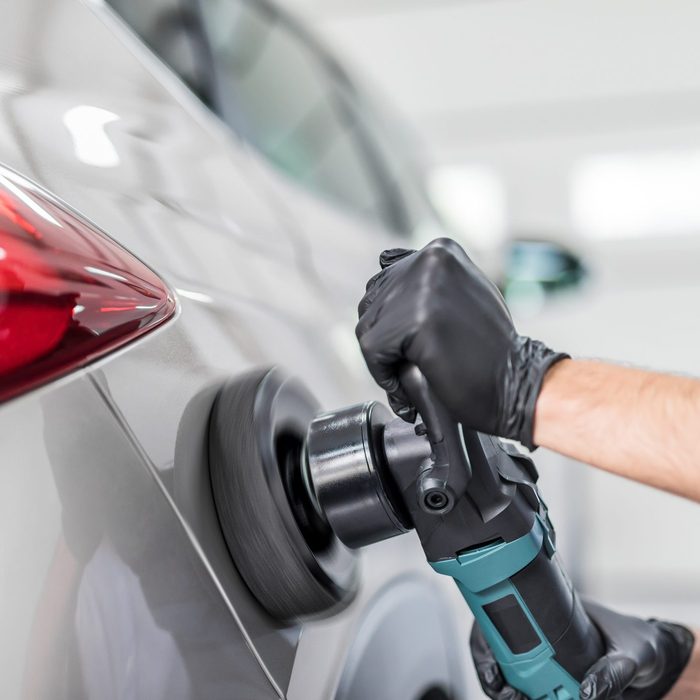What Is Car Detailing?

If you're asking what is car detailing, you've come to the right place. Find out what it is, what you can do yourself and what is best left to a pro.
I got my first taste of car detailing while living near a certain Rolls-Royce-loving spiritual teacher in the 1980s. He had a whole fleet of luxury vehicles (no one really knows why), and it took a team of workers to keep them in pristine condition. My job was to polish the metal trim after someone delivered it to the carpentry shop where I worked.
Most car detailers — like my brother, a Jaguar fanatic — don’t go to nearly this much effort. But the work they do is far beyond a standard car wash. Detailing a car is like restoring the original finish on a piece of antique furniture. It’s painstaking work that makes the vehicle stand out.
Many owners of vintage cars, like my brother, prefer to do their own detailing as a weekend hobby. For those without time to do it themselves, there’s at least one professional detailing shop in most communities, and one or more tradespeople who will come to your home.
Anyone can do detailing. But it takes years of experience, and the right tools, to complete an outstanding job in a reasonable time frame.
On This Page
What Is Car Detailing?
Detailing makes a car look like new. It may start with an automated car wash, but everything else is done by hand, using microfiber cloths, tools (vacuums and polishers) and specialty cleaning supplies (clay bars, degreasers, waxes and sealers).
A standard car detailing usually includes the following procedures on the outside of the vehicle:
- Hand-wash and dry the exterior;
- Removing soap residue and cleaning swirls with a clay bar;
- Polish the vehicle to restore the shine;
- Apply wax or another sealer to protect the finish.
On the inside, standard detailing involves the following:
- Vacuum the seats, carpets, mats and cargo area or trunk, sometimes steam-cleaning to remove tough stains;
- Wipe or wash the dashboard, console and doors;
- Clean all the glass, including the windshield, windows and rearview mirrors;
- Clean and condition leather upholstery;
- Deodorize the vehicle and add perfume to give it a “new car” smell.
When Is Car Detailing Important?
If you like driving a new-looking car, detailing is the only way to maintain that kind of appearance. Even if you aren’t all about appearance, detailing is important when:
- You want a more comfortable ride. Detailers remove clutter, clean the glass and get rid of unwanted odors.
- You want to sell your car. You can quickly increase a car’s value with good detailing.
- The car’s finish is damaged or failing. Restorative detailers can correct defects and apply a protective coating to prevent further damage.
- You want to lengthen the life of your car. Some detailers offer underbody and engine cleaning, which sometimes reveals oil leaks and other problems.
- You have a vintage vehicle. Without detailing, an old car just looks old. With detailing, it becomes a collector’s item.
Types of Car Detailing
The quality of car detailing is in … the details. The more of them the detailers address, the better the results and the higher the price tag.
There are five types of service. Not all companies offer all of them, but you don’t always need the more expensive ones.
- Standard exterior: The quality varies from hand-washing and polishing after the car has been through an automatic car wash to a more extensive service that includes a complete hand washing, cleaning the wheel rims and tires, paint claying, polishing and sealing the finish.
- Standard interior: Basic services involve vacuuming the mats, wiping down the dashboard and console and cleaning the windows and mirrors. A more expensive service offers steam-cleaning, deodorizing and disinfecting.
- Full car: This includes interior and exterior detailing.
- Restorative detailing: Also known as corrective detailing, this focuses on the exterior and addresses things like scratches in the finish and flaking or fading paint. It can take several days, and it’s expensive. But when completed, the car often looks better than it did new.
- Show-car detailing: This is the Rolls-Royce of detailing services, reserved for high-end cars that seldom see any road time.
DIY Car Detailing vs. Hiring a Pro
If you’re like my brother, you might actually enjoy spending your weekends detailing your car. As long as that doesn’t involve restoration, there’s no reason not to go for it.
Depending on the quality of service, car detailing can cost from $50 to $300. That’s a substantial amount you can save by DIYing your car care. You’ll need tools and products, so there’s an initial investment.
Restorative detailing, on the other hand, is best handled by a pro. Without the necessary skill and equipment, you’ll probably make your car look worse. It takes a professional’s eye to match the paint color and apply it in just the right way to match the sheen on the rest of the vehicle. If you botch this, you may need to repaint the entire car.



